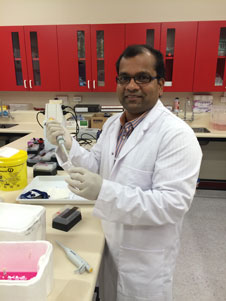 Thursday 17 December 2015 10:39am
Thursday 17 December 2015 10:39am
Dr Rajesh Katare
A new study by a team of researchers from the University of Otago and Japan suggests that the appetite-regulating hormone ghrelin could be used clinically for the early treatment of critical limb ischemia (CLI), an advanced form of peripheral artery disease.
CLI is the severe obstruction of blood flow to the extremities that often requires major amputations and in half of all cases leads to death within five years. It is characterised by pain at rest, non-healing ulcers, and gangrene. Its leading risk factors are diabetes, obesity and age.
Using a mouse model of CLI, Otago Department of Physiology researchers Dr Rajesh Katare, Dr Daryl Schwenke and colleagues showed that administering ghrelin daily over two weeks markedly improved blood flow in affected limbs.
They found that ghrelin promoted growth of new structurally and functionally normal blood vessels, improved cell survival, and decreased tissue fibrosis.
Their research is newly published in the international journal Endocrinology.
Dr Katare says the findings are exciting as currently there are no drugs treatments for CLI and other techniques are effective in only half of the cases.
“Our team has previously shown that ghrelin showed promise for treating the presently incurable lung disease known as pulmonary hypertension, which is caused by blood vessels becoming progressively blocked.
“This prompted us to investigate whether ghrelin might have a similar effect in CLI.”
The researchers also studied ghrelin's action at the molecular level in tissue with restricted blood supply and identified that the hormone modulated downstream signalling cascades involved in new blood vessel growth and cell survival.
“Our results provide a platform for future studies to look at the long-term potential of ghrelin to see if it could indeed become a standard treatment for CLI,” Dr Katare says.
For more information, contact:
Dr Rajesh Katare
Senior Lecturer
Department of Physiology and HeartOtago
Otago School of Medical Sciences
University of Otago
Tel 64 3 479 7292
Email rajesh.katare@otago.ac.nz
Publication details:
Ghrelin Promotes Functional Angiogenesis in a Mouse Model of Critical Limb Ischemia Through Activation of Proangiogenic MicroRNAs
Rajesh Katare Shruti Rawal, Pujika Emani Munasinghe, Hirotsugu Tsuchimochi, Tadakatsu Inagaki, Yutaka Fujii, Parul Dixit, Keiji Umetani, Kenji Kangawa, Mikiyasu Shirai, and Daryl O. Schwenke
Endocrinology
Abstract: http://press.endocrine.org/doi/abs/10.1210/en.2015-1799
A list of Otago experts available for media comment is available elsewhere on this website.
Electronic addresses (including email accounts, instant messaging services, or telephone accounts) published on this page are for the sole purpose of contact with the individuals concerned, in their capacity as officers, employees or students of the University of Otago, or their respective organisation. Publication of any such electronic address is not to be taken as consent to receive unsolicited commercial electronic messages by the address holder.
